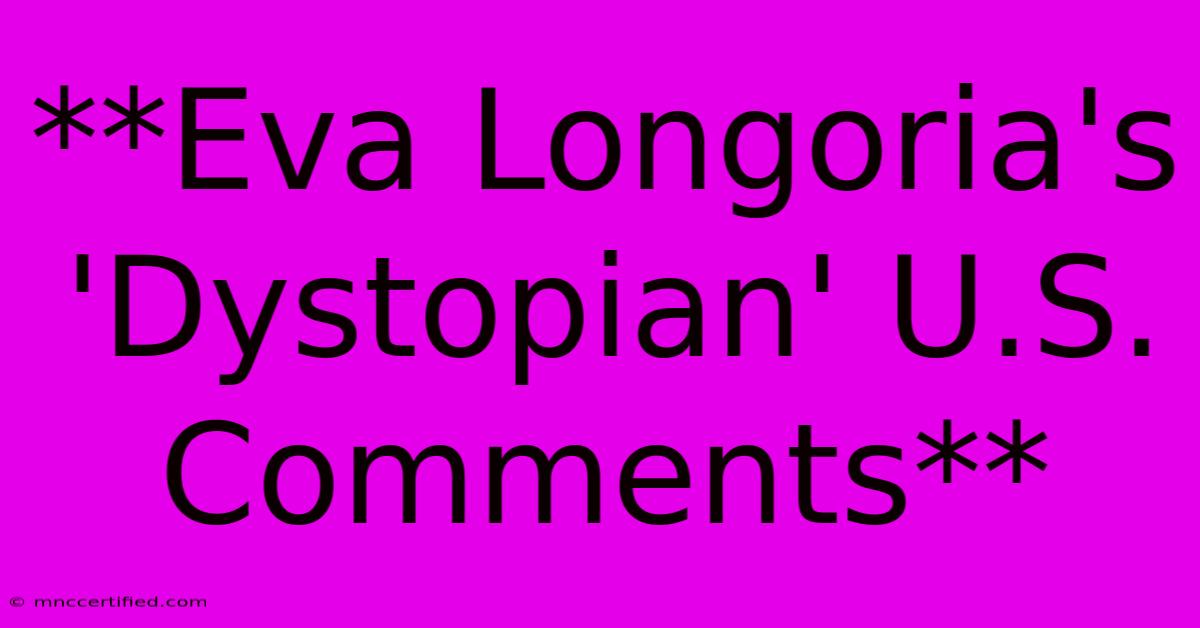**Eva Longoria's 'Dystopian' U.S. Comments**

Table of Contents
Eva Longoria's 'Dystopian' U.S. Comments Spark Debate: Is America Truly a Dystopia?
Actress and activist Eva Longoria recently sparked a heated debate with her comments about the United States. During an interview with The Guardian, she described the current state of the country as "dystopian," drawing attention to issues like gun violence, healthcare, and political polarization.
While some praised Longoria for speaking out, others criticized her for painting a bleak picture of America. This article will delve into the context of her comments, analyze the arguments for and against her "dystopian" claim, and explore the broader implications of her words on the national conversation.
Longoria's Concerns: A Reflection of Growing Social Unease
Longoria's comments stemmed from her personal experiences and observations of American society. She specifically highlighted the issue of gun violence, citing her own fear for her children's safety. The recent mass shootings, coupled with the lack of meaningful gun control measures, fueled her sense of unease.
Her concerns extend beyond gun violence. Longoria also pointed to the lack of affordable healthcare and the widening political divide as major sources of distress. These issues are widely recognized as significant challenges facing the U.S., affecting the lives of millions.
The Argument for "Dystopian" America: A Reality Check or Exaggeration?
Those who agree with Longoria's assessment argue that the current state of America is indeed troubling. They point to the following factors:
- Gun Violence: The United States has significantly higher rates of gun violence compared to other developed nations. The recent rise in mass shootings and the lack of effective gun control measures contribute to a sense of insecurity and fear.
- Healthcare Crisis: The U.S. healthcare system is plagued by high costs, limited access, and bureaucratic complexities. Millions struggle to afford basic healthcare, leading to financial hardship and health disparities.
- Political Polarization: The increasing divide between political parties has resulted in gridlock, inaction, and a decline in civic discourse. This polarization fuels distrust and animosity, undermining the foundation of a functioning democracy.
However, critics of Longoria's "dystopian" claim argue that her perspective is overly pessimistic and fails to recognize the positive aspects of American society. They emphasize:
- Economic Powerhouse: The U.S. remains a global economic leader, offering opportunities for innovation and progress.
- Individual Freedoms: The country boasts a strong commitment to individual liberties, including freedom of speech, religion, and the press.
- Resilience and Adaptability: Despite challenges, America has a long history of overcoming obstacles and adapting to change.
Beyond the Debate: The Importance of Dialogue and Action
While the "dystopian" label may be subjective, Longoria's comments serve as a powerful reminder of the pressing issues facing the country. Her willingness to speak out encourages a much-needed dialogue about these complex problems.
However, moving beyond mere debate requires concrete action. Addressing the underlying causes of social unrest and promoting a more equitable and just society are critical steps toward building a brighter future.
In Conclusion: Eva Longoria's "dystopian" remarks have sparked a timely conversation about the state of America. While her assessment may be controversial, it forces us to confront the realities of our current social and political landscape. The conversation should move beyond labels and focus on finding solutions to address the issues that are impacting the lives of millions. Only through collective action and a shared commitment to progress can we build a better future for all Americans.

Thank you for visiting our website wich cover about **Eva Longoria's 'Dystopian' U.S. Comments**. We hope the information provided has been useful to you. Feel free to contact us if you have any questions or need further assistance. See you next time and dont miss to bookmark.
Featured Posts
-
Tate Mc Raes So Close To What Album Announced
Nov 15, 2024
-
Tate Mc Raes So Close To What Album Out In 2025
Nov 15, 2024
-
How To Qualify For Jupiter Airdrop
Nov 15, 2024
-
T20 Cricket Australia Beats Pakistan By 29 Runs
Nov 15, 2024
-
Taylor Swift Concert Downtown Toronto Buzz
Nov 15, 2024